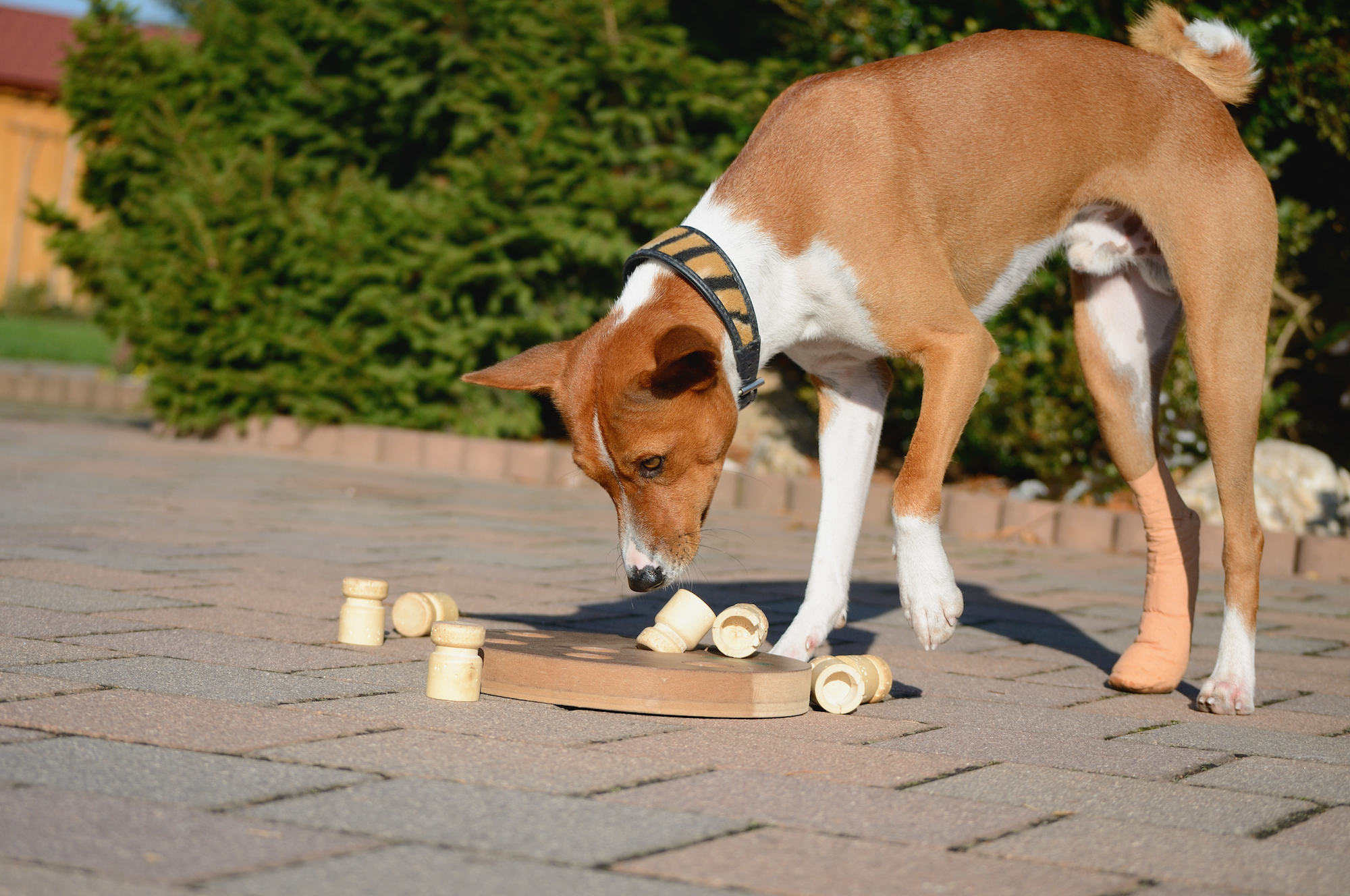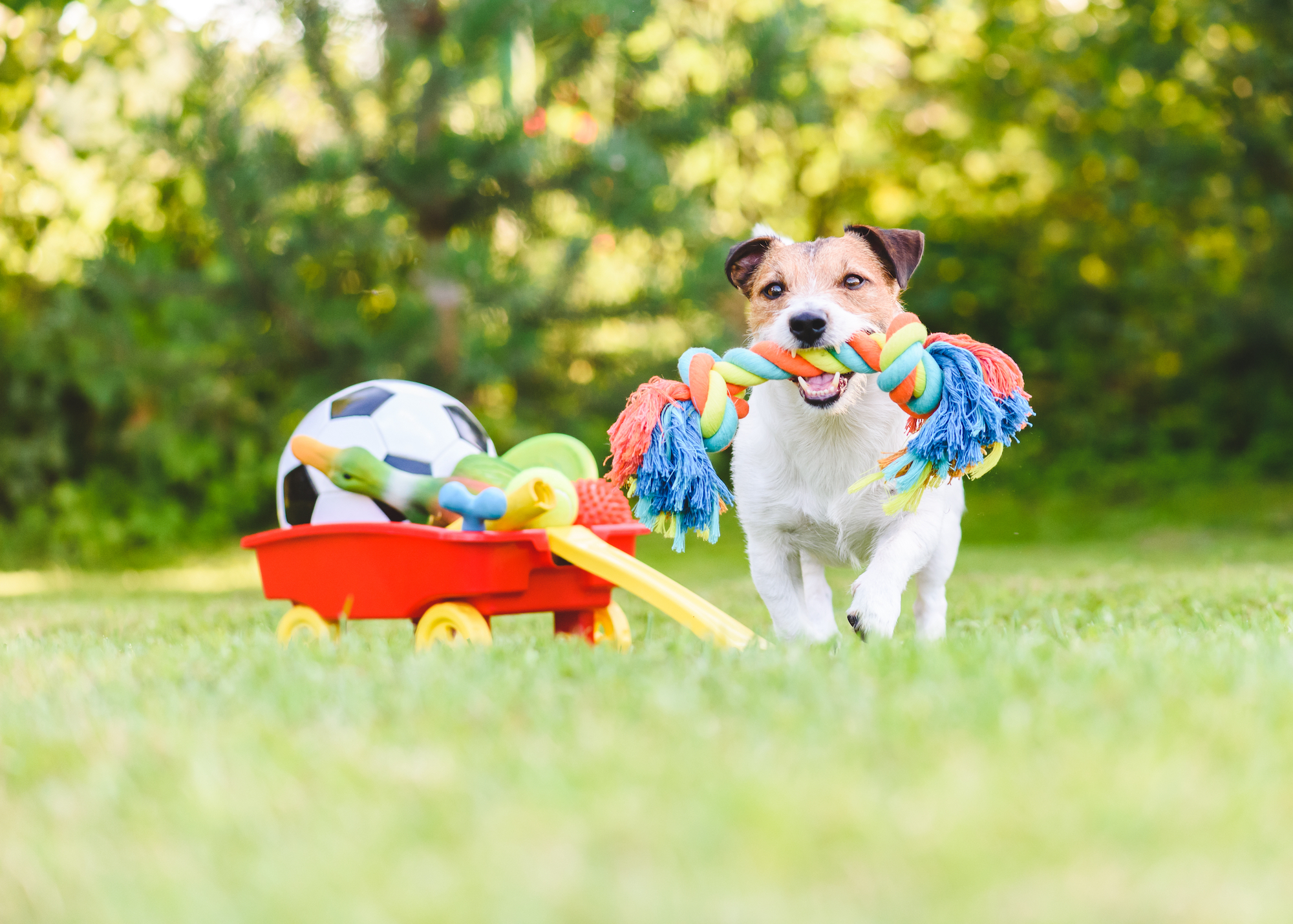Dogs need mental exercise. They are intelligent animals, not unthinking machines. So, when considering the type of exercise to give them, it’s a mistake to focus exclusively on the physical.
Denise Herman, founder and head trainer at Empire of the Dog in New York City, recommends regularly giving dogs both “aerobic” and “non-aerobic” exercise—meaning that long walks and marathon games of fetch, while fun and helpful, shouldn’t be the only workouts they get. Opting for a solely physical regimen, she says, is “training [a dog] to just sack out from exhaustion versus training them in coping strategies. I want your dog to be able to sit calmly and ‘read a book.’”
Aside from the behavioral dividends, there’s evidence that many dogs naturally want a job to do. When we spoke to Dr. Marc Bekoff—professor emeritus of Ecology and Evolutionary Biology at the University of Colorado, Boulder—for our article about how to make your dog happy, he discussed a concept called contrafreeloading. “It basically means,” he said, “that these animals, given the choice of easy-to-get food or hard-to-get food, don’t mind working.” While you shouldn’t force your dog to work for food to the point that it frustrates them or they don’t get calories, try giving them a chance to put in some effort and then receive the fruits of a job well done.
Dogs, like humans, don’t want to be bored. Many of them crave a challenge, and have been bred for generations to perform jobs like retrieving, herding, and hunting that require them to work their minds and bodies together. While every dog is an individual, it’s likely that yours would benefit from having a problem to solve.
It’s not that hard to give your dog mental exercise
Getting your dog mental exercise doesn’t have to be complicated or time-consuming. You can incorporate mind workouts into activities like walks and mealtimes.
Mental exercise can include “sniffing things on a walk, slowing down and doing some investigation,” says Herman. Instead of hustling your friend along during every walk, let them explore the scents that they find interesting. This can help them stay sharp and happy, as smell is a very important sense for dogs.
You can also let your dog “hunt” for their food. “It’s easy to [turn a meal] into a mental-energy-burning activity,” Herman says, “because it’s something you’re giving them anyway.” This can involve a food puzzle, a puzzle bowl, or—in the case of treats—a snuffle mat (a mat with extra fabric where you can hide goodies).
Enriching these staples of your dog’s daily routine with interesting twists may not take any longer than doing them without the extra brain games. “It’s not adding a part to their schedule,” Herman says. “It’s harnessing a part of their schedule.”
There are lots of different ways to give your dog mental exercise
Here are a few of the many brain games you can try with your own dog:
- Shuffle cups in front of you, one of which has a treat hidden beneath it. When your dog chooses the correct cup, they get the treat.
- Teach your dog new tricks. Keep the training sessions fun, reward them when they get it right, and give them breaks if they get tired.
- Build your dog an obstacle course to navigate.
- Teach your dog the names of individual objects like toys, and see how big their vocabulary gets. Not every pup is going to be the record-setting border collie Chaser, but many of them can pick up quite a few words.
- Fill a Kong with some food or treats and freeze it.
- Hide food around your home, yard, or deck, and let them search for it.
For any of these games, adjust the difficulty and reward as needed. Some food-based “games” require little more than persistence. Others may involve manipulating a series of flaps and sliders to achieve an intended result. Perhaps your scavenger hunt will be tough enough with treats out in the open—but an industrious dog may like methodically sniffing around for, and excavating, buried treasure.
If your dog gives up, troubleshoot. Herman says to ask yourself: “Is it too hard? Is it too easy or boring? Or do you just need to bring out heavier artillery?” By “heavier artillery,” Herman means more novel or tempting treats.
If your dog seems to have trouble following the plot, ease up a bit. If they seem to have mastered the tasks, consider adding another layer of challenge. Pay attention to their body language and make sure they’re having a good time—remember that you’re giving them the opportunity to learn something, not requiring that they work for food.
Your life will be easier if your dog gets mental exercise
Most dog owners want to spend as much time as they can with their pups—but even if you have a flexible schedule, there will almost certainly be moments when your dog is without you. Mental workouts can help keep them calm and satisfied during those times. If you give your dog more mental exercise when you’re together, they’re less likely to have excess energy later. And if you give your dog something to do when you leave, they stand a better chance of passing that time happily instead of becoming miserable and destructive. A frozen Kong with some treats will keep them busy and engaged much longer than an open bowl full of their food.
These tools will also give you options when it’s raining, freezing, or scorching hot, and hours in the park are not on the table. Having more ways to entertain your dog is almost certain to come in handy for both of you.
Your dog’s life will be better if they get mental exercise
Dogs of any age are likely to benefit from some cerebral undertakings, but mental exercise can become even more important as pups age and their physical abilities wane.
Some older dogs, Herman says, end up bored because they can’t run around like they used to. They may have joint issues or other conditions that prevent them from exerting themselves too much physically, but “Their brain is still there,” and they still need “something to look forward to.”
Herman’s own dog, in her older years, “ate out of the Kong in her little bed, riddled with her heart problems and all of that,” she says, “until the day she died in her sleep of old age.”
Mental exercise may help dogs keep their minds sharp as they age, too. And it’s never too late to introduce your dog to brain games. “Your dog doesn’t stop being a hunter or scavenger by biology,” Herman says. “It’s like an older person taking up sudoku or checkers or something they’ve never done before—it’s good for their brain and good for their quality of life to learn some new things.”
The post Why You Should Play Mind Games With Your Dog appeared first on The Farmer's Dog.


Comments
Post a Comment